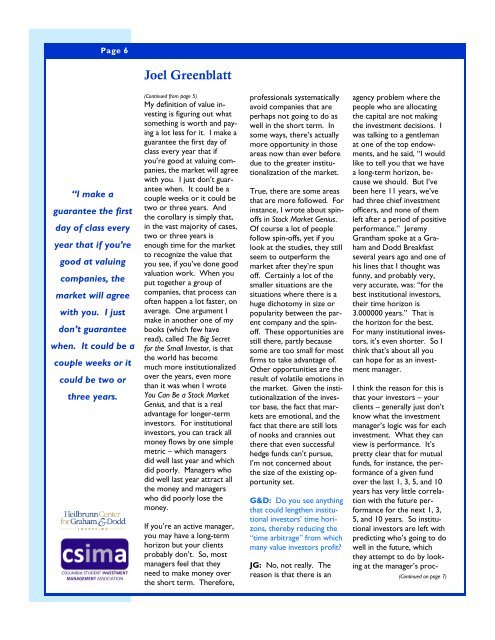Graham & Doddsville - Columbia Business School
Graham & Doddsville - Columbia Business School
Graham & Doddsville - Columbia Business School
Create successful ePaper yourself
Turn your PDF publications into a flip-book with our unique Google optimized e-Paper software.
“I make a<br />
Page 6<br />
guarantee the first<br />
day of class every<br />
year that if you’re<br />
good at valuing<br />
companies, the<br />
market will agree<br />
with you. I just<br />
don’t guarantee<br />
when. It could be a<br />
couple weeks or it<br />
could be two or<br />
three years.<br />
Joel Greenblatt<br />
(Continued from page 5)<br />
My definition of value investing<br />
is figuring out what<br />
something is worth and paying<br />
a lot less for it. I make a<br />
guarantee the first day of<br />
class every year that if<br />
you’re good at valuing companies,<br />
the market will agree<br />
with you. I just don’t guarantee<br />
when. It could be a<br />
couple weeks or it could be<br />
two or three years. And<br />
the corollary is simply that,<br />
in the vast majority of cases,<br />
two or three years is<br />
enough time for the market<br />
to recognize the value that<br />
you see, if you’ve done good<br />
valuation work. When you<br />
put together a group of<br />
companies, that process can<br />
often happen a lot faster, on<br />
average. One argument I<br />
make in another one of my<br />
books (which few have<br />
read), called The Big Secret<br />
for the Small Investor, is that<br />
the world has become<br />
much more institutionalized<br />
over the years, even more<br />
than it was when I wrote<br />
You Can Be a Stock Market<br />
Genius, and that is a real<br />
advantage for longer-term<br />
investors. For institutional<br />
investors, you can track all<br />
money flows by one simple<br />
metric – which managers<br />
did well last year and which<br />
did poorly. Managers who<br />
did well last year attract all<br />
the money and managers<br />
who did poorly lose the<br />
money.<br />
If you’re an active manager,<br />
you may have a long-term<br />
horizon but your clients<br />
probably don’t. So, most<br />
managers feel that they<br />
need to make money over<br />
the short term. Therefore,<br />
professionals systematically<br />
avoid companies that are<br />
perhaps not going to do as<br />
well in the short term. In<br />
some ways, there’s actually<br />
more opportunity in those<br />
areas now than ever before<br />
due to the greater institutionalization<br />
of the market.<br />
True, there are some areas<br />
that are more followed. For<br />
instance, I wrote about spinoffs<br />
in Stock Market Genius.<br />
Of course a lot of people<br />
follow spin-offs, yet if you<br />
look at the studies, they still<br />
seem to outperform the<br />
market after they’re spun<br />
off. Certainly a lot of the<br />
smaller situations are the<br />
situations where there is a<br />
huge dichotomy in size or<br />
popularity between the parent<br />
company and the spinoff.<br />
These opportunities are<br />
still there, partly because<br />
some are too small for most<br />
firms to take advantage of.<br />
Other opportunities are the<br />
result of volatile emotions in<br />
the market. Given the institutionalization<br />
of the investor<br />
base, the fact that markets<br />
are emotional, and the<br />
fact that there are still lots<br />
of nooks and crannies out<br />
there that even successful<br />
hedge funds can’t pursue,<br />
I’m not concerned about<br />
the size of the existing opportunity<br />
set.<br />
G&D: Do you see anything<br />
that could lengthen institutional<br />
investors’ time horizons,<br />
thereby reducing the<br />
“time arbitrage” from which<br />
many value investors profit?<br />
JG: No, not really. The<br />
reason is that there is an<br />
agency problem where the<br />
people who are allocating<br />
the capital are not making<br />
the investment decisions. I<br />
was talking to a gentleman<br />
at one of the top endowments,<br />
and he said, “I would<br />
like to tell you that we have<br />
a long-term horizon, because<br />
we should. But I’ve<br />
been here 11 years, we’ve<br />
had three chief investment<br />
officers, and none of them<br />
left after a period of positive<br />
performance.” Jeremy<br />
Grantham spoke at a <strong>Graham</strong><br />
and Dodd Breakfast<br />
several years ago and one of<br />
his lines that I thought was<br />
funny, and probably very,<br />
very accurate, was: “for the<br />
best institutional investors,<br />
their time horizon is<br />
3.000000 years.” That is<br />
the horizon for the best.<br />
For many institutional investors,<br />
it’s even shorter. So I<br />
think that’s about all you<br />
can hope for as an investment<br />
manager.<br />
I think the reason for this is<br />
that your investors – your<br />
clients – generally just don’t<br />
know what the investment<br />
manager’s logic was for each<br />
investment. What they can<br />
view is performance. It’s<br />
pretty clear that for mutual<br />
funds, for instance, the performance<br />
of a given fund<br />
over the last 1, 3, 5, and 10<br />
years has very little correlation<br />
with the future performance<br />
for the next 1, 3,<br />
5, and 10 years. So institutional<br />
investors are left with<br />
predicting who’s going to do<br />
well in the future, which<br />
they attempt to do by looking<br />
at the manager’s proc-<br />
(Continued on page 7)



